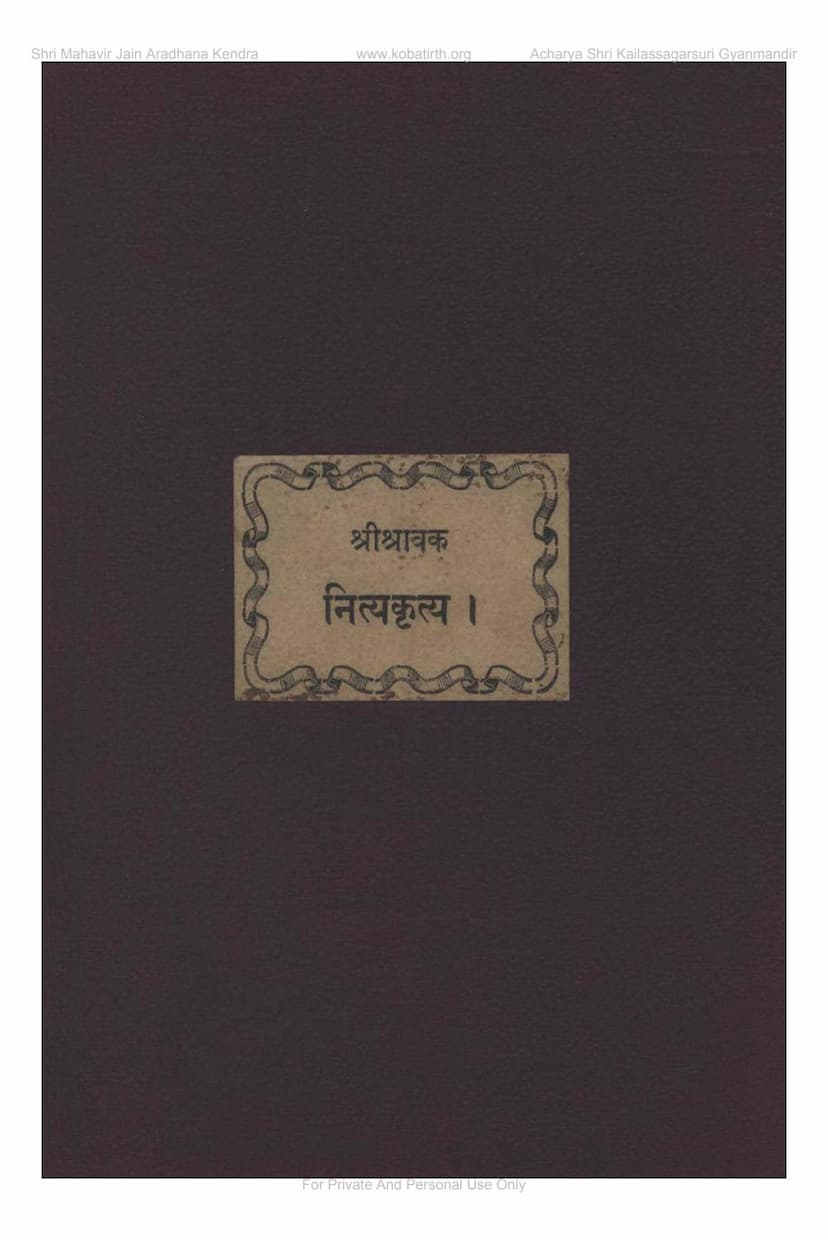Shravak Nitya Krutya
Added to library: September 2, 2025

Summary
This Jain text, titled "Shravak Nitya Krutya" (श्रावक नित्य कृत्य) by Acharya Shri Jinkrupachandrasuri and published by Nirnaysagar Press, is a comprehensive guide to the daily rituals and practices of a Jain lay follower (Shravak). The catalog link provided indicates it is part of a collection of ancient texts.
Here's a breakdown of its content based on the provided index and pages:
Core Purpose:
The book serves as a manual for Shravaks to perform their prescribed daily duties (Nitya Krutya) in accordance with Jain principles and practices. It aims to guide them in their spiritual discipline, adherence to vows, and devotion to the Tirthankaras and the Jain faith.
Key Sections and Rituals Covered:
The index (अनुक्रमणिका) on page 4 and subsequent pages reveal the extensive range of practices covered. These include:
-
Morning Rituals:
- Navkar Mantra (नवकार): The fundamental prayer of Jainism, to be recited.
- Sthapanaacharya Rituals (स्थापनाचार्यजीना पडिलेहण): Rituals performed in front of an idol or representation of an Acharya.
- Khama Saman (खमासमण): A gesture of apology and seeking forgiveness, performed multiple times throughout the day.
- Inquiring about the Guru's well-being (सुगुरुसुख साता): A respectful inquiry to the spiritual teacher.
- Mukhapatti Rituals (मुहपत्ती पडिलेहण): Rituals involving the Mukhapatti (a cloth worn over the mouth to prevent harming micro-organisms).
- Body Purification Rituals (शरीर २५ पडिलेहण): Detailed procedures for purifying the body.
-
Daily Spiritual Practices (Samayik):
- "Karemi Bhante Samayikam" (करेमि भंते सामाइयं): The commencement of the Samayik (meditation/equanimity period).
- "Iriyavahi" (इरियावहि): A prayer acknowledging and seeking forgiveness for any unintentional harm caused through movement.
- "Annath Usasiasen" (अन्नत्थ ऊससि ०): A prayer related to bodily functions and their purification.
- "Logassa Ujjojagare" (लोगस्स उज्जोअगरे): A significant prayer praising the Tirthankaras and seeking blessings.
- "Raat Pratikraman Vidhi" (राइ प्रतिक्रमणविधि): Rituals for the evening transgression review.
- Various Stotras and Chaitra Vandans (स्तवन, चैत्यवंदन): Numerous devotional songs and praises dedicated to Tirthankaras, specific sacred sites (like Siddhachal, Shatrunjaya, etc.), and important Jain figures (like Ganadhar Pundarik, Jinadatta Suri, Jinakushala Suri, etc.). The index lists hundreds of these.
-
Pratikraman (Transgression Review):
- The text details the process of Pratikraman, both for the day (Devasikam) and night (Raatrikraman). This involves identifying and repenting for any transgressions (Aticharas) of vows and principles.
- "Sabbassa vi Raatyam" (सबस्सवि राश्य): A part of the Pratikraman process.
- "Ajnuna Char Prahara" (आजुणाच्यारपहर): Contemplations related to different parts of the day.
-
Fasting and Vows (Pacharpan):
- A significant portion of the book is dedicated to various types of fasts (Pacharpan) observed by Shravaks, including:
- Navkarasi Pacharcan (नवकारसी पञ्चरकाण)
- Vigai Pacharcan (विगय प०) - Abstaining from certain types of food.
- Deshavagash Pacharcan (देसावगास प०) - Limiting consumption to certain areas or times.
- Paurshi Pacharcan (पोरसीमुसी प०) - Fasts for a period of Paurshi (approx. 3 hours).
- Ekashan (एकाशन) - Eating only once a day.
- Ekalthano (एकलठाणो) - Eating at one specific location.
- Ambil Pacharcan (आंबिलपच्च०) - A specific type of fast involving certain food restrictions.
- Upavas (उपवास) - Full day fasts.
- Chauvihar Upavas (चउविहार उपवास) - Fasting without consuming water, food, or certain other items.
- Tivihar Upavas (तिविहार उपवास) - Fasting with specific restrictions.
- Datt Pacharcan (दात प०) - Possibly related to giving donations or vows.
- Divascharim Chauvihar Upavas (दिवसचरिमं चउविहार प०) - End-of-day fasts.
- Panahar (पाणहार) - Possibly related to water consumption.
- Bhavcharim (भवचरिम) - Fasts related to life stages or circumstances.
- A significant portion of the book is dedicated to various types of fasts (Pacharpan) observed by Shravaks, including:
-
Other Important Sections:
- Sutak Vichar (सूतकविचार): Rules and guidelines regarding impurity due to birth or death.
- Asajjhay Vichar (असज्झाइविचार): Conditions under which reciting scriptures is prohibited.
- Food Consumption Rules (खानेपीने की वस्तुकाकाल प्रमाण): Guidelines on how long certain food items remain pure.
- Guru Puja (सद्गुरुपूजन): Worship of the spiritual teacher.
- Bhaktaamar Stotra (भक्तामरस्तोत्र): A widely recited Jain hymn.
- Jin Panchara Stotra (जिनपंजरस्तोत्र): A protective hymn.
- Panch Gyana Pragataavva (पांचज्ञानप्रगटायवा): Explanations related to the five types of knowledge in Jainism.
- Navpad Guna (नवपदगुण): Praises and contemplation of the nine supreme entities in Jainism.
- Chaitra Vandans (चैत्यवंदन): Rituals performed in temples or at sacred sites.
- Various Stotras (स्तुति): Numerous devotional hymns, including those dedicated to specific Tirthankaras (Rishabhnath, Neminath, Parshvanath, Mahavir, etc.) and auspicious occasions.
Key Themes:
- Devotion and Reverence: The text emphasizes deep devotion to the Tirthankaras, Acharyas, and the principles of Jainism.
- Ahimsa (Non-violence): Underlying all practices is the principle of Ahimsa, extending to all living beings, which is reflected in the detailed purification rituals and careful conduct.
- Discipline and Self-Control: The daily routine prescribed involves strict discipline in actions, speech, and thoughts, along with various forms of fasting and vows.
- Repentance and Purification: The Pratikraman rituals highlight the importance of acknowledging and purifying oneself from any transgressions.
- Guidance for Lay Followers: The book is specifically designed for householders, outlining the necessary practices to maintain a spiritual life while living in the world.
In essence, "Shravak Nitya Krutya" is a foundational text for Jain Shravaks, providing a comprehensive and detailed roadmap for their daily spiritual engagement, ensuring they live a life aligned with the teachings of the Tirthankaras.